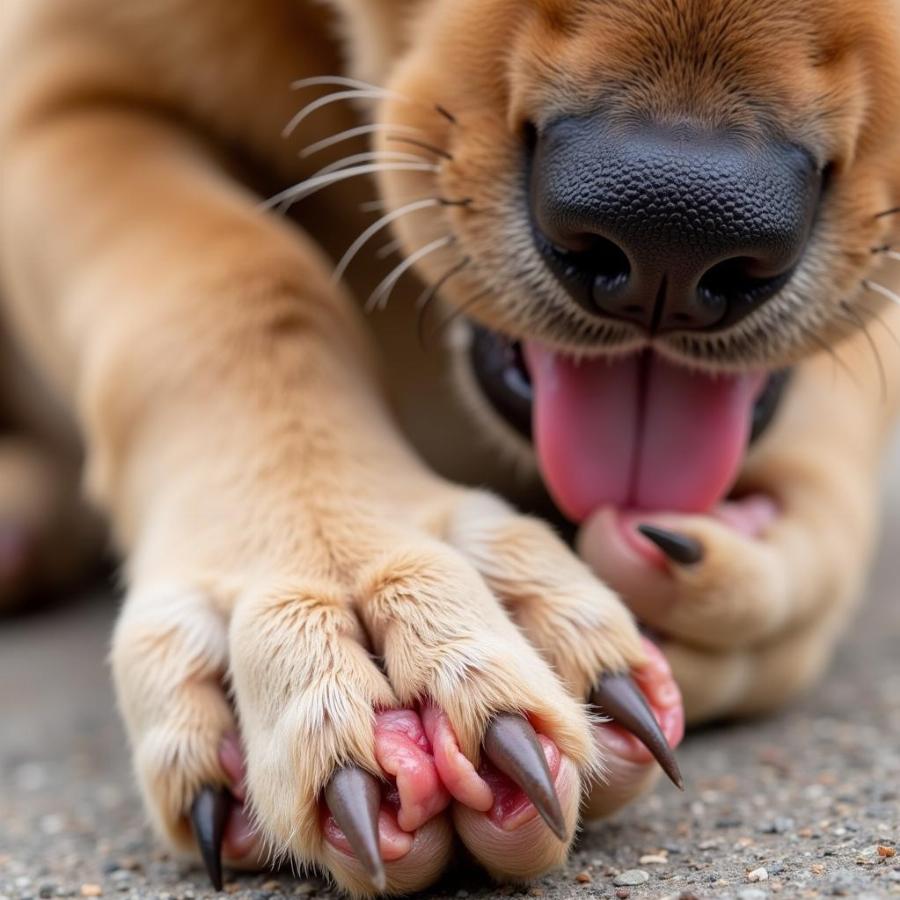Is your canine companion spending an unusual amount of time licking their legs? While occasional grooming is normal dog behavior, excessive licking can be a cause for concern. This comprehensive guide will delve into the various reasons why dogs engage in this behavior and provide valuable insights into potential solutions.
Understanding the Causes of Excessive Leg Licking in Dogs
Dogs lick their legs for a variety of reasons, ranging from simple hygiene to more complex medical conditions. Identifying the root cause is crucial for determining the appropriate course of action. Let’s explore some common culprits:
1. Allergies: A Common Trigger for Canine Discomfort
Just like humans, dogs can suffer from allergies, and these often manifest as skin irritations. Common allergens include pollen, dust mites, mold, and even certain food ingredients. If you notice your dog licking their legs more frequently during specific seasons or after eating certain foods, allergies could be the culprit.
Expert Insight:
“Food allergies are often overlooked as a potential cause of excessive licking in dogs,” says Dr. Emily Parker, a certified veterinary dermatologist. “If you suspect a food allergy, consult your veterinarian about an elimination diet to pinpoint the offending ingredient.”
2. Parasites: Tiny Creatures Causing Big Problems
Fleas, ticks, and mites can wreak havoc on your dog’s skin, causing intense itching and irritation. If your dog is excessively licking their legs, especially around the paws and ankles, parasites could be the underlying issue.
 Dog scratching its paws
Dog scratching its paws
3. Dry Skin: Environmental Factors and Solutions
Dry skin can be uncomfortable for dogs, prompting them to lick the affected areas for relief. Factors such as dry weather, low humidity, and even frequent bathing can contribute to dry skin in dogs.
Expert Insight:
“Using a moisturizing shampoo formulated for dogs and adding omega-3 fatty acids to their diet can significantly improve skin hydration,” advises Dr. Sarah Miller, a veterinarian specializing in canine dermatology.
4. Injuries: From Minor Scrapes to Serious Wounds
Dogs are prone to minor cuts, scrapes, and other injuries, especially on their legs. Licking the affected area is their natural instinct to clean the wound and promote healing. However, excessive licking can hinder the healing process and even lead to infection.
5. Anxiety and Boredom: When Licking Becomes a Coping Mechanism
In some cases, excessive leg licking can be a behavioral response to anxiety, stress, or boredom. Dogs may engage in this behavior as a way to self-soothe or pass the time when they lack mental and physical stimulation.
Expert Insight:
“Providing your dog with ample exercise, mental enrichment through interactive toys, and positive reinforcement training can help alleviate anxiety-driven behaviors,” recommends Dr. Mark Thompson, a certified applied animal behaviorist.
6. Pain and Arthritis: Seeking Solace Through Licking
Just like humans, dogs can experience pain and discomfort from conditions like arthritis. They may lick their legs in an attempt to soothe aching joints or muscles.
When to Seek Veterinary Attention
If your dog’s leg licking is persistent, accompanied by other symptoms such as redness, swelling, hair loss, or a foul odor, it’s crucial to consult your veterinarian. These could be signs of a more serious underlying condition that requires prompt medical attention.
Beaut Dogs: Your Trusted Resource for Canine Well-being
Beaut Dogs is your go-to source for all things related to canine care, providing reliable and insightful information to help you understand and nurture your furry companions. From breed-specific insights to comprehensive health and nutrition guides, we strive to empower dog owners with the knowledge they need to provide the best possible care.
For personalized advice and support, reach out to us at [email protected]. Beaut Dogs – committed to the well-being of your beloved canine companions.